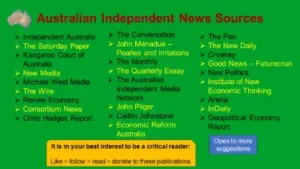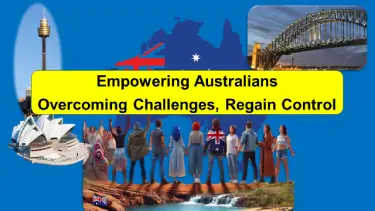Description:
Explore how Australians can reclaim control amid challenges like animal cruelty, corporate politics, and economic struggles.
Introduction: The Australian Dilemma
Empowering Australians. Australia is a nation rich with opportunities and beauty, yet many Australians feel increasingly powerless in the face of significant challenges. From the disturbing realities of animal cruelty to the pervasive influence of corporate interests in politics, and the economic pressures that weigh heavily on everyday citizens, these issues present a stark contrast to the country’s potential. This article aims to explore how Australians can regain control over their lives, influence politics for the better, and support those who are struggling. The focus is on actionable steps and practical solutions that empower individuals and communities to drive positive change.
Understanding the Current State of Affairs
Animal Cruelty: A Dark Reality in Australia
Animal cruelty remains a pressing issue in Australia, particularly in industries like horse and greyhound racing. Despite Australia’s love for animals, these sports have been marred by cases of mistreatment, where animals are often pushed beyond their limits for profit. Documented incidents of abuse, neglect, and even death in these racing industries have sparked public outrage and calls for reform. The ethical concerns extend beyond the racing tracks, with many questioning whether these forms of entertainment are worth the cost to animal welfare.
Cruelty in Horse and Greyhound Racing
 Horse and greyhound racing are industries deeply embedded in Australian culture. However, the treatment of animals in these sports has come under increasing scrutiny. Horses are often subjected to intense training regimens, leading to physical and psychological stress, while greyhounds face similar hardships, with many being abandoned or euthanized once they are no longer profitable. Advocates for animal rights argue that stricter regulations and oversight are necessary to protect these animals from exploitation.
Horse and greyhound racing are industries deeply embedded in Australian culture. However, the treatment of animals in these sports has come under increasing scrutiny. Horses are often subjected to intense training regimens, leading to physical and psychological stress, while greyhounds face similar hardships, with many being abandoned or euthanized once they are no longer profitable. Advocates for animal rights argue that stricter regulations and oversight are necessary to protect these animals from exploitation.
Corporate Influence in Politics: Who Holds the Power?
 In Australia, the influence of corporate interests on politics has become a significant concern. Companies and wealthy donors often have a disproportionate say in policy decisions, leading to outcomes that prioritize profits over the well-being of citizens. This dynamic erodes public trust in government and contributes to a sense of powerlessness among ordinary Australians. The issue is further exacerbated by the lack of transparency in political donations and the revolving door between the corporate sector and political office.
In Australia, the influence of corporate interests on politics has become a significant concern. Companies and wealthy donors often have a disproportionate say in policy decisions, leading to outcomes that prioritize profits over the well-being of citizens. This dynamic erodes public trust in government and contributes to a sense of powerlessness among ordinary Australians. The issue is further exacerbated by the lack of transparency in political donations and the revolving door between the corporate sector and political office.
Corruption in Public Office: Undermining Democracy
Corruption within public office is another factor that undermines trust in Australia’s democratic institutions. Scandals involving misuse of public funds, conflicts of interest, and unethical behavior by politicians have made headlines, fueling public disillusionment. These incidents highlight the need for stronger anti-corruption measures and greater accountability for those in power. Without such reforms, the integrity of Australia’s political system remains at risk.
Economic Struggles of Ordinary Citizens: The Daily Grind
For many Australians, the economic landscape has become increasingly challenging. Rising costs of living, stagnant wages, and job insecurity are just some of the issues that people face daily. The economic pressures are particularly acute for low-income families, who struggle to make ends meet despite working long hours. The gap between the wealthy and the rest of the population continues to widen, leading to greater inequality and social unrest. Understanding these economic struggles is crucial to developing solutions that can help lift people out of poverty and provide them with a stable future.
The Power of Awareness and Education
Educating the Public: Knowledge as a Tool for Change
One of the most powerful tools for combating the challenges facing Australia is education. An informed public is better equipped to advocate for change and hold those in power accountable. Education in this context goes beyond traditional schooling; it involves raising awareness about key issues, encouraging critical thinking, and empowering citizens to take action. By staying informed about current events, understanding the underlying causes of societal problems, and learning about potential solutions, Australians can become active participants in shaping their country’s future.
Role of Media: Amplifying Voices for Change
 The media plays a crucial role in shaping public perception and driving social change. While it can sometimes contribute to negativity by focusing on sensational stories, the media also has the power to highlight positive developments and amplify the voices of those advocating for change. By supporting independent journalism and consuming media that prioritizes accuracy and integrity, Australians can ensure they are getting a balanced view of the issues at hand. Additionally, citizens can use social media platforms to raise awareness about important causes and connect with like-minded individuals.
The media plays a crucial role in shaping public perception and driving social change. While it can sometimes contribute to negativity by focusing on sensational stories, the media also has the power to highlight positive developments and amplify the voices of those advocating for change. By supporting independent journalism and consuming media that prioritizes accuracy and integrity, Australians can ensure they are getting a balanced view of the issues at hand. Additionally, citizens can use social media platforms to raise awareness about important causes and connect with like-minded individuals.
Grassroots Movements: Power from the Ground Up
Grassroots movements have long been a driving force for social and political change. In Australia, these movements have been instrumental in raising awareness about issues such as climate change, animal rights, and political reform. By organizing at the community level, grassroots groups can mobilize citizens, put pressure on policymakers, and create a ripple effect that leads to broader societal change. These movements demonstrate that ordinary people can make a difference when they come together around a common cause.
Taking Political Action
Voting and Electoral Reform: The Power of the Ballot
Voting is one of the most direct ways for Australians to influence political outcomes. However, the current electoral system often leaves voters feeling disillusioned, particularly when it seems that major parties are more focused on serving corporate interests than the public good. Advocating for electoral reform, such as introducing proportional representation or reducing the influence of money in politics, can help ensure that elections truly reflect the will of the people. Citizens can also get involved in political campaigns, support independent candidates, and push for policies that increase transparency and accountability.
Citizen-Led Initiatives: Real-World Success Stories
Citizen-led initiatives have a proven track record of driving change in Australia. From grassroots campaigns to community organizing, these initiatives show that when people come together with a shared goal, they can achieve remarkable results. Examples include successful campaigns to protect the environment, secure better working conditions, and improve public services. By learning from these examples and getting involved in similar efforts, Australians can take control of the issues that matter most to them.
Holding Politicians Accountable: Tools and Strategies
Holding politicians accountable is essential for maintaining a healthy democracy. There are several ways citizens can ensure their elected representatives act in the public’s best interest. These include participating in public forums, writing to local representatives, and using online platforms to track politicians’ voting records and public statements. Additionally, supporting organizations that advocate for government transparency and accountability can help keep pressure on politicians to act ethically and responsibly.
Community Support and Solidarity
Building Stronger Communities: The Importance of Local Action
Strong communities are the backbone of a resilient society. By fostering connections with neighbors, participating in local events, and supporting community initiatives, Australians can create a network of support that helps everyone thrive. Local action is particularly important in times of crisis, as it allows communities to respond quickly to challenges and ensure that no one is left behind. Building stronger communities also involves advocating for policies that protect public services, such as healthcare, education, and social welfare.
Supporting Nonprofits and Charities: Making a Difference Together
Nonprofits and charities play a vital role in addressing social issues and providing support to those in need. By donating time, money, or resources to these organizations, Australians can contribute to efforts that improve the lives of their fellow citizens. Whether it’s supporting animal welfare groups, helping those experiencing homelessness, or advocating for environmental protection, there are countless ways to get involved and make a positive impact.
Social Justice Advocacy: Fighting for Equality and Fairness
Social justice advocacy is about promoting policies and initiatives that ensure all Australians have the opportunity to succeed. This includes fighting against discrimination, advocating for fair wages, and pushing for affordable housing and healthcare. Social justice advocates work to create a society where everyone has access to the resources they need to live a fulfilling life. By supporting these efforts, Australians can help build a more just and equitable society.
Personal Empowerment
Mental and Emotional Resilience: Staying Strong in Tough Times
Maintaining mental and emotional resilience is crucial for navigating the challenges of modern life. This involves developing coping strategies, seeking support when needed, and taking care of one’s mental health. Practices such as mindfulness, meditation, and regular exercise can help individuals manage stress and stay focused on their goals. Additionally, connecting with others who share similar experiences can provide a sense of community and support.
Financial Literacy: Navigating Economic Challenges
Financial literacy is an essential skill for managing personal finances and achieving long-term stability. By understanding how to budget, save, and invest, Australians can take control of their financial futures and reduce the impact of economic pressures. Financial literacy programs and resources are widely available, and citizens are encouraged to take advantage of these opportunities to improve their financial well-being.
Engagement in Local Issues: Becoming a Community Leader
Getting involved in local governance and community activities is a powerful way to make a difference. Whether it’s attending town hall meetings, joining a local board, or volunteering for community projects, there are many ways to contribute to the betterment of one’s community. By becoming a community leader, individuals can influence local decisions, advocate for important issues, and inspire others to take action.
Policy Recommendations
Strengthening Animal Welfare Laws: Protecting Vulnerable Creatures
One of the most effective ways to combat animal cruelty is through stronger laws and regulations. This includes advocating for stricter oversight of industries like horse and greyhound racing, as well as harsher penalties for those who mistreat animals. Public support for these measures is crucial, as it puts pressure on lawmakers to prioritize animal welfare. Additionally, education campaigns can help raise awareness about the importance of treating animals with kindness and respect.
Reducing Corporate Influence: Ensuring Fair Representation
To ensure that the voices of ordinary Australians are heard, it’s essential to reduce the influence of corporate money in politics. This can be achieved through campaign finance reform, transparency in political donations, and measures that limit the revolving door between the corporate sector and public office. By supporting these reforms, citizens can help create a political system that truly represents their interests.
Anti-Corruption Measures: Restoring Trust in Government
Anti-corruption measures are vital for maintaining the integrity of Australia’s political system. These can include the establishment of independent anti-corruption commissions, stricter enforcement of existing laws, and greater transparency in government decision-making. By holding politicians accountable and ensuring that public office is free from corruption, Australians can restore trust in their government and ensure that it works for the people.
Economic Support for Struggling Citizens: Building a Fairer Society
Empowering Australians by ensuring that all Australians have access to economic support is essential for creating a fairer society. This includes policies that provide a living wage, affordable housing, and access to quality healthcare and education. By advocating for these measures, citizens can help reduce inequality and ensure that everyone has the opportunity to succeed. Additionally, targeted support for vulnerable populations, such as the elderly and disabled, can help lift people out of poverty and provide them with the resources they need to thrive.
Conclusion
Recap of Key Points
In summary, Australia faces significant challenges, but there are concrete steps that citizens can take to regain control and drive positive change. By staying informed, taking political action, supporting their communities, and advocating for policy reforms, Australians can overcome the obstacles they face and build a brighter future for all.
Call to Action
As a reader, you have the power to make a difference. Whether it’s getting involved in local politics, supporting a nonprofit, or simply staying informed, your actions can help shape the future of Australia. Take the first step today by learning more about the issues that matter to you and finding ways to get involved.
Reader Interaction
What challenges do you see in your community, and how can you take action to address them? Share your thoughts and ideas in the comments below, and let’s work together to create a better Australia.
Social Sharing
If you found this article helpful, please share it on social media to help spread the word. Together, we can empower more Australians to take control of their lives and their country.



pammid23@yahoo.com.au
Hi Pamela,
You did not make a comment???